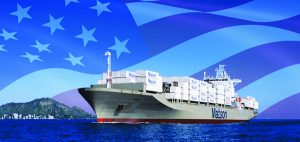
The Jones Act–More Relevant Than Ever
The Jones Act–More Relevant Than Ever
As one of the nation’s leading U.S.-flag carriers, Matson operates its Hawaii and Alaska services under the provisions of the federal law known as the Jones Act. The Jones Act is a federal law that ensures that companies engaged in domestic shipping comply with U.S. laws, and it requires that the vessels used in domestic services be built in U.S. shipyards, are owned by U.S. citizens and crewed by U.S. citizens. It does not prevent foreign-flag vessels from calling at U.S. ports; it does prohibit them from carrying domestic cargo between ports in the U.S.
Given today’s geopolitical climate and the importance of maritime to our country’s economy and national defense, the security provided by the Jones Act in allowing the U.S. to control its own critical national infrastructure is more important than ever.
This is the time of year when political opponents of the Jones Act are especially active in pushing for changes or repeal of the law.
This often appears in the form of Opinion Page news commentaries placed by increasingly well-funded national political groups like the Cato Institute, which then get pushed out on social media platforms to stimulate debate.
Most often, we hear Jones Act opponents blame the law for making things expensive, which is an easy argument to make since much of what we buy requires transportation, and there is a cost for that. However, they grossly overstate the law’s impact on transportation costs and ignore or dismiss the biggest benefit of the law – national security.
Here are some key facts about the Jones Act that you can rely on if it comes up in conversation:
The Jones Act is the key to Hawaii’s reliable long-term supply chain.
- The American standard of living that is supported in Hawaii by retail stores and other U.S.-regulated businesses
relies on frequent, cost-efficient deliveries of everyday necessities. - Under the Jones Act, U.S.-owned and regulated shipping companies have a vested interest in stability and serving
the needs of a domestic marketplace over the long term. - Foreign-owned carriers operating international services alter routes and schedules frequently, moving assets
around whenever and wherever demand suits their bottom line. During the pandemic, international carriers cut services dramatically and later raised their rates more than ten times – by up to 700% in total – while American maritime has kept rates and service levels steady in domestic tradelanes.
The Jones Act ensures U.S. control of critical national infrastructure.
- With all the uncertainties in the world today, it makes even less sense to allow foreign interests to operate or control any part of our country’s transportation system.
- Ensuring the security and reliability of domestic transportation systems is a foundational national priority.
- Similar laws apply to every major mode of transportation in the U.S., including airline, trucking and rail transportation, as well as the maritime industries of 91 other member countries of the United Nations – all to prevent foreign control of critical domestic infrastructure.
The Jones Act does not prevent foreign competition.
- Foreign carriers have been serving Hawaii directly for years.
- The Jones Act does not prohibit foreign carriers from delivering goods to any U.S. port.
- Foreign carriers can deliver foreign goods to any U.S. port and then continue to any other U.S. port. What the law does not allow them to do is transport domestic goods from one U.S. port to another.
The Jones Act is not a driver of Hawaii’s cost of living.
- Hawaii economists have consistently said the biggest drivers are housing and energy costs…not consumer goods.
- Cost comparisons with mainland stores show little or no price difference on most goods.
- The frequency and reliability of domestic services governed by the Jones Act actually save inventory and warehouse costs for local businesses because goods arrive on a just-in-time basis, in many cases going straight from ship to store shelves.
There are other important national defense and economic reasons that the Jones Act has had widespread bi-partisan support in Congress and the White House for the past century:
National Defense – The Jones Act ensures that the U.S. maintains a robust domestic fleet, which is imperative for national security. U.S. Transportation Command – (USTRANSCOM) has called the Jones Act an indispensable component of our national defense, stating, “The U.S. flagged commercial fleet is vital to the Joint Force’s ability to accomplish its mission.”
U.S. Economy – The domestic maritime industry supports nearly 650,000 jobs and $150 billion in economic activity. American maritime also produces nearly $42 billion in labor income and contributes more than $16 billion in taxes annually. If not for the Jones Act, much of this economic activity would be outsourced to foreign countries.

